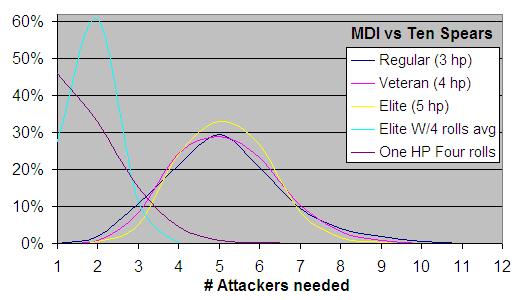T-hawk
Transcend
I'd like to point out (again) that there is a *big* difference between increasing the number of hitpoints for units, and averaging some rolls for each hitpoint outcome. Charis' analysis stops just short of addressing the precise issue. The graph gives the odds of winning battles, and averaging four rolls does give similar results to iterating 4 HP, yes.
What this doesn't analyze is the damage that the stronger unit receives even in winning the battle. Increasing the hitpoints keeps the damage dealt to each side in line with expectations, adding a buffer to absorb some of the statistical randomness. Averaging the rolls tilts the *percentage outcome* of each hitpoint toward the stronger unit.
Damage taken by the stronger unit in winning doesn't really matter for tank-vs-spearman, which is what Firaxis had in mind, and why it was overlooked. But damage taken by the stronger unit *does* matter in many situations; indeed, it's a core component of the game balance. When? Anytime you attack a defender that has a higher modified combat value than the attacker, which is the entire game from pikemen on up to mech infantry.
This is why the averaging change breaks the game balance. The game mechanics rely on being able to use swarms of knights to overwhelm musketmen, cavalry to overwhelm rifles and infantry, even lots of modern armors to overwhelm mechs given the number of multiplicational advantages available to the defender by that time.
Average four rolls for each HP of combat, and suddenly you require double or triple the number of attacking units to defeat stronger defenders. Is this the price we really want to pay for slightly increased determinism when a strong unit attacks a weak defender?
What this doesn't analyze is the damage that the stronger unit receives even in winning the battle. Increasing the hitpoints keeps the damage dealt to each side in line with expectations, adding a buffer to absorb some of the statistical randomness. Averaging the rolls tilts the *percentage outcome* of each hitpoint toward the stronger unit.
Damage taken by the stronger unit in winning doesn't really matter for tank-vs-spearman, which is what Firaxis had in mind, and why it was overlooked. But damage taken by the stronger unit *does* matter in many situations; indeed, it's a core component of the game balance. When? Anytime you attack a defender that has a higher modified combat value than the attacker, which is the entire game from pikemen on up to mech infantry.
This is why the averaging change breaks the game balance. The game mechanics rely on being able to use swarms of knights to overwhelm musketmen, cavalry to overwhelm rifles and infantry, even lots of modern armors to overwhelm mechs given the number of multiplicational advantages available to the defender by that time.
Average four rolls for each HP of combat, and suddenly you require double or triple the number of attacking units to defeat stronger defenders. Is this the price we really want to pay for slightly increased determinism when a strong unit attacks a weak defender?



